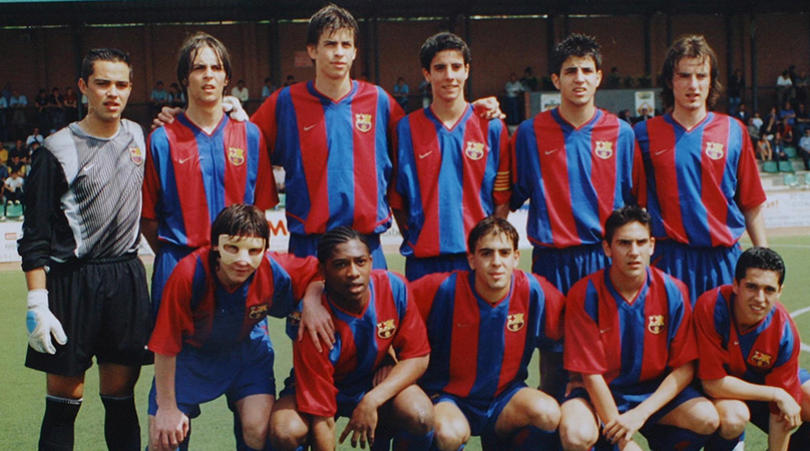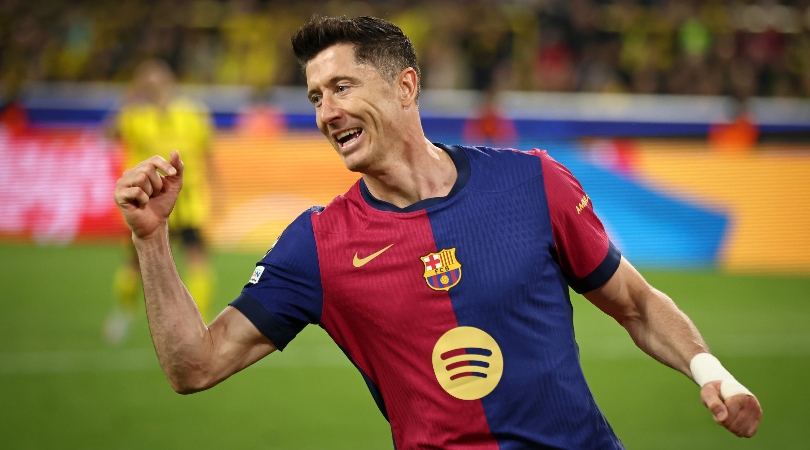How Royston Drenthe finally found the love: via Real Madrid, warring with Moyes – and rap music
When their under-21s won the 2007 European Championship, Dutch fans hoped they’d unearthed the next golden generation, with Real Madrid-bound winger Drenthe its poster boy. It’s safe to say things didn’t quite go to plan...
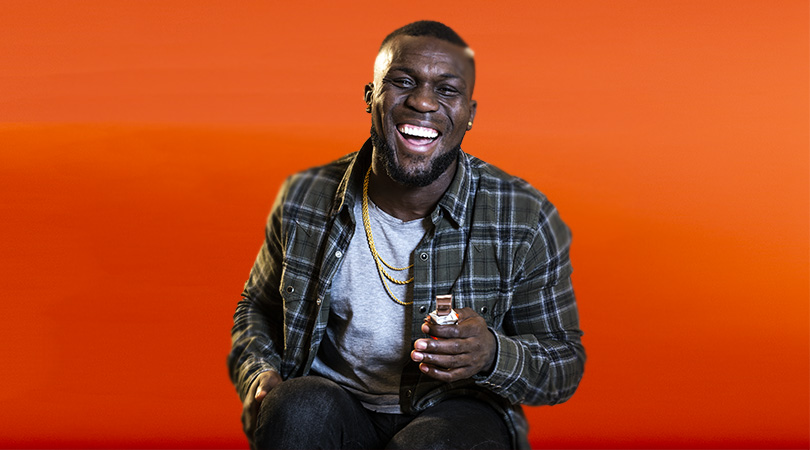
The original version of this feature originally appeared in the March 2019 issue of FourFourTwo. Subscribe now! 5 issues for £5
Suddenly there was a message from his lawyer. Would he be interested in speaking to Sparta Rotterdam of the Dutch second division? The club were targeting an immediate return to the Eredivisie in the forthcoming 2018/19 season, and they wanted to add more experienced players to their squad.
Royston Drenthe mulled it over. He’d quit professional football two years previously, aged just 29, fed up with the game and a career that had promised much but delivered a lot less, not least in unpaid wages.
Sparta were hardly the first club to approach the former Real Madrid winger and Holland international about a return to playing. Since his early retirement, he had launched himself into a number of ventures, from music to the worlds of fashion and fitness. Why would he go back to football now?
But this felt different. The people running the club knew Drenthe, knew how to motivate him, and were prepared to show some faith in him. Although he’d been strong in his conviction that retiring was the right thing to do after so many disheartening experiences, he was still only 31. There was no harm in training with Sparta for a week and seeing what happened. Maybe this could be his route to deliverance.
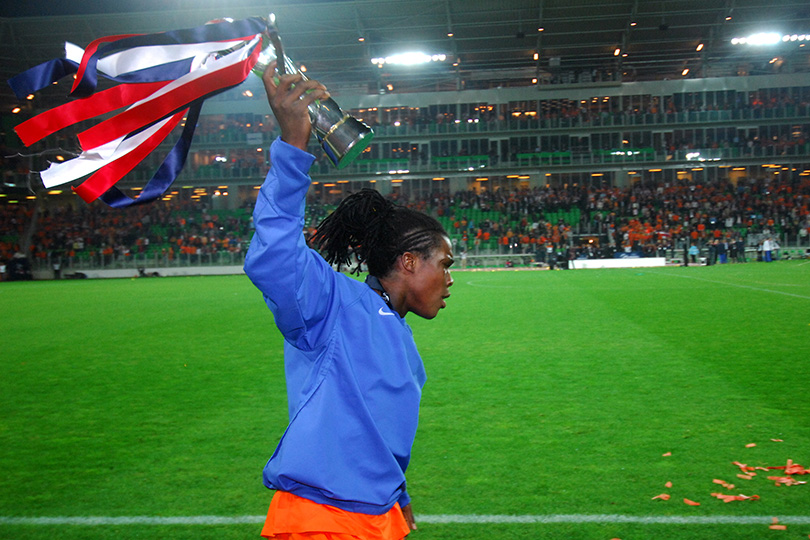
When Drenthe was 19, he had his legs tattooed. The teenager, who had recently made his senior debut for Feyenoord, went into his first full season as a pro with a laughing clown on his left calf and a crying clown on his right, captioned with the phrase: ‘Smile now, cry later’. Being left-footed, that leg carried the positive image – but he knew the future would hold setbacks.
It was a remarkable attitude for a young footballer to broadcast on his body, presenting ambition but also wariness, even maturity. Today, Drenthe tells FourFourTwo that although the tattoos were borne from impulse, the message was not. “You have to be realistic,” explains the Dutchman. “Always.”
Get FourFourTwo Newsletter
The best features, fun and footballing quizzes, straight to your inbox every week.
The body art would prove prophetic. Drenthe’s later career brought plenty of reasons to send in the clowns. At first, however, there was plenty for him to smile about, even as the ink dried.
He soon commanded a starting spot at Feyenoord, where he earned cult status with his never-say-die attitude on the pitch. In one Boxing Day clash at home to PSV Eindhoven, the local lad assisted Feyenoord’s equaliser and played through cramp until eventually being stretchered off in the closing minutes.
Such displays earned Drenthe a place in the Dutch squad for 2007’s European Under-21 Championship on home soil, where his endless running and attacking verve won him the Golden Player gong while his team lifted the trophy. Drenthe’s name was immediately pencilled into the scouting books of every elite club.
“At the time I heard that 16 clubs were interested in me,” he recalls to FFT, looking back at a time when the world was at his feet. “I spoke with Barcelona president Joan Laporta and Predrag Mijatovic, director of football at Real Madrid. It felt like I met almost every high-ranking official at every club. Most of them offered me a five-year contract with more or less the same conditions.”
Chelsea were yet another suitor, offering a long-term deal with the option to remain at Feyenoord for one more year, but Drenthe had no hesitation: “As soon as I heard Real Madrid were interested, my mind was made up.”
Los Blancos had a unique pull on the young winger. “As a boy, I was fascinated by everything around the club,” he reveals. “The glamour around Real, like the kind you see in the movie Goal!, was something I really wanted to be part of.” His dream switch to the Bernabeu was sealed on August 9, 2007.
“I immediately felt at home,” continues Drenthe. “Everyone gave me a warm welcome. Guti was cool with me straight away, and he was the man in Madrid – a legend. I developed a good bond with Robinho soon after I arrived. Sometimes I would go to his house, where he’d converted his basement into a mini-nightclub.”
Drenthe had entered a new world and adapted quickly, on the pitch as well as off it.
It took the Dutchman only 23 minutes to make a lasting impression on his competitive debut at the Bernabeu. In the second leg of Real’s Spanish Super Cup clash, Drenthe dummied his way past a Sevilla player and smashed a 35-yard shot off the crossbar and over the line (then back onto the bar, such was its power). His name was up in lights, and expectations were set.
He remembers those early days fondly. “It was just magic,” he says. “We had a lot of good players with the right mix of experience and youth, from Ruud van Nistelrooy, Guti and Raul to young guys like me, [Gonzalo] Higuain, [Fernando] Gago and Marcelo. It clicked instantly. In that situation, a manager doesn’t have too much to do.”
So it seemed, as Bernd Schuster took Real Madrid to the league title with a record-breaking 85 points, 18 clear of Barcelona. It would be his only full season. Schuster left the club in December 2008 with Madrid 5th after 14 games and already nine points behind the Catalans, led by new boss Pep Guardiola. “That was something new to me,” admits Drenthe, “seeing a coach sacked so quickly.”
It was an indication of how unstable life at the Bernabeu could be, which was something Drenthe would quickly experience first-hand. He got match action in La Liga and Champions League alike and his first season went well. But inconsistent performances in the second, in parallel with the team’s struggles, drew the wrath of Real Madrid’s notoriously impatient supporters.
In 2009/10 the winger had a brief revival at left-back. “That season I was able to eat opponents,” he tells FFT. “I thought I’d be playing in every game. There was no reason to take me out of the team, but the board said Marcelo had to play too, and after that we took it in turns. [General manager] Jorge Valdano was probably keener on Marcelo.”
The next season, Jose Mourinho arrived from Inter. “Mourinho told me that I’d be given playing time,” explains Drenthe. “But in the end, he said Valdano had indicated it would be better for me to go on loan. I mentioned to Valdano what Jose had told me, but the decision was made. I had to be loaned out.”
Drenthe left Madrid with a heavy heart. Joining Hercules in Alicante provided an instant tonic. In his first game, the newly promoted side stunned Pep’s Barcelona 2-0 at Camp Nou.
The loanee was deluged with texts from his Madrid team-mates, delighted to see one of their own helping to defeat the club’s arch rivals in their own back yard. Drenthe was popular even in absentia. “He’s a fantastic lad and a funny guy,” enthused Cristiano Ronaldo. “We miss him in the dressing room. He’s our joker.”
Drenthe was well-liked at Hercules as well, for his combative style – perhaps too combative, sometimes, with eight bookings in 15 starts – and his outgoing nature.
He organised social evenings and poker nights, inviting team-mates and locals he’d met.
“I like socialising,” he smiles, “and I try to follow my gut feeling with who I can trust. You shouldn’t be too guarded as a person.” (This would become a theme: at Reading, later in his career, Royston held a draw on Instagram for a day of FIFA at his house, with six young Royals supporters chosen and the champion winning £500 and a match-worn shirt. Then, at Baniyas in Abu Dhabi, the Dutchman organised online Call of Duty battles and invited the winners to attend his exclusive birthday bash.)
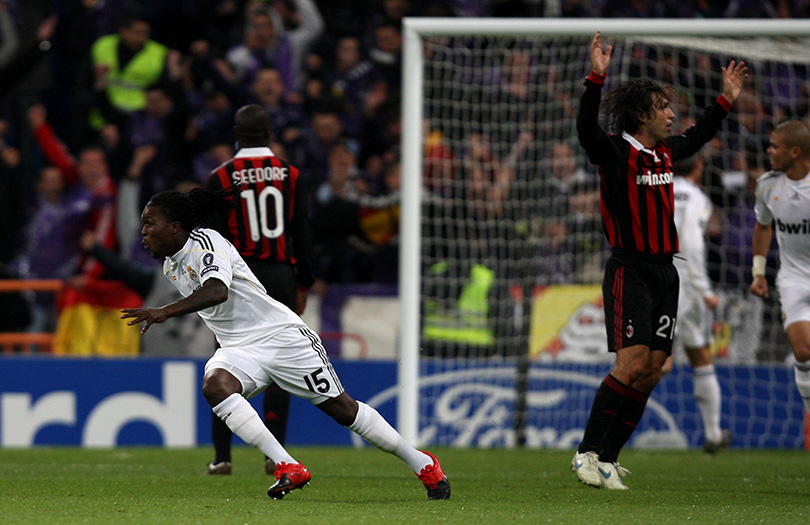
At Hercules, however, Drenthe’s generous habits made it harder for him to handle financial setbacks. Not for the last time in his career, he wasn’t paid his wages and went on strike in protest at the situation. “That was the first time that side issues caused me trouble in football,” he recalls. “I took it really seriously and perhaps it left a mark there.”
It may have planted a seed of doubt in the minds of the footballing world. At the very least it ruined his time with Hercules, where he was forced to remain despite interest from Juventus. “They wanted to take me on loan and I had Real Madrid’s permission, but Hercules wanted €1 million from Juve,” says Drenthe. Instead, he stayed in Alicante and Hercules were relegated.
The 24-year-old didn’t receive much sympathy upon returning to Madrid. “Mourinho wasn’t too happy that I’d gone on strike,” admits Drenthe. “He said that, as a Real Madrid player, I couldn’t do that. But he only said that at the end of the season. He could have called me at Hercules to ask about the situation there.”
Drenthe was made to train separately while a solution was found.
Eventually, David Moyes came to the rescue. In August 2011, Drenthe was loaned to Everton, where once again he made a flying start. He scored or assisted seven goals in his first 10 Premier League outings – despite being a substitute in six of them – including a superb curling effort against Fulham, hit first time.
“Together with my first months at Hercules, I had the best spell of my career at Everton,” he reflects. Yet it was to end in disappointment, this time with Drenthe at fault.
He endured a difficult relationship with Moyes, and the wideman found himself distracted by off-field temptations such as the pool parties at his residence. As his timekeeping got worse, player and gaffer clashed several times, and it all came to a head when Drenthe turned up late for a team meeting before the Toffees’ FA Cup semi-final in April 2012: a Merseyside derby against Liverpool.
“I was waiting outside the room,” he explains, “whereas I probably should have just walked in quietly and taken a seat. When I went in afterwards, Moyes told me to f**k off. I should have accepted it, but I said, ‘What do you mean, f**k off, bro? You f**k off.’ And then I left for Holland and didn’t come back.”
Older, wiser, Drenthe admits things could have been a bit different: “If I’d adapted more to Moyes I think I’d have reaped the benefits, as initially I did play a lot under him.”
That summer, his contract with Real Madrid ended. “There was quite a bit of interest,” says Drenthe, “but Real Madrid were still in my head and it was difficult to let go – I was comparing every other team with them. I had everything in Madrid, including my house. It was difficult to leave that behind me.”
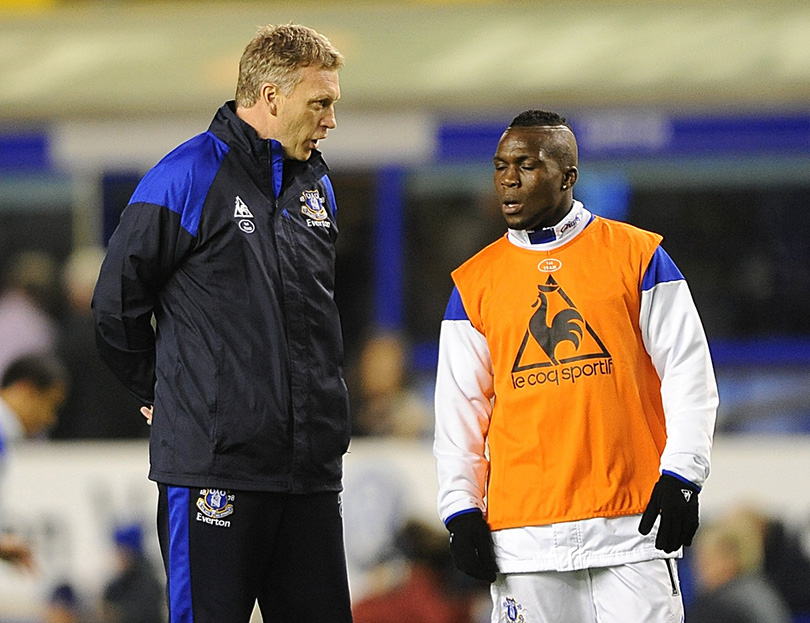
The only other team Drenthe wanted to play for was Feyenoord, his boyhood club. The Rotterdammer even approached them directly himself, but no deal was forthcoming.
Disillusioned, he abandoned any active searching for a new side. His daily structures fell away, creating a vacuum that was filled by poker and parties. He opened a clothes shop, but it closed two years later.
Yet from all of the chaos came serenity. That fashion outlet somehow brought him back to football. Russian Premier League side Alania Vladikavkaz were so eager to secure Drenthe’s services that they found a creative way to get in touch.
“They knew I had a shop in Rotterdam and continually called there,” reveals the Dutchman. “They couldn’t reach me, so one day they just turned up and tried to find me. People from the shop phoned me to say there were some Russians who wanted to speak with me.”
As intimidating as that sounds, Drenthe relented, and despite some initial reluctance – he reminded Alania that he hadn’t played football in six months – he agreed a three-and-a-half-year contract with the persistent Russians. Once again he had to contend with non-payment issues, but the spell reignited the fire within him. Drenthe chipped in with several impressive displays, scoring a hat-trick in a 3-1 win over Mordovia Saransk, even as Alania wound up being relegated alongside Mordovia (before being wound up altogether).
And then: another twist of fate. At a team get-together in Moscow, Drenthe bumped into one Anton Zingarevich: only five years the player’s senior but, coincidentally, the owner of Reading at the time.
“He also managed a restaurant called Maradona, where the team ate and watched matches,” says Drenthe. “One day, he told me that he’d bought an English club and wanted to take me over there. At first I was like, ‘What are you talking about? Who are you?’ But he proved to be the person he said he was, and soon enough I went to Reading,” Drenthe chuckles. “Life is just psycho.”
The twists kept coming. Zingarevich left Reading a year later and the Royals, saddled with the Russian’s signings, told Drenthe that his salary was too high. Sheffield Wednesday took him on loan in September 2014, paying half of his wages.
Four months after that, he joined Kayseri Erciyesspor in Turkey, where he signed a contract lasting two-and-a -half years, only to encounter a familiar issue. And when, six months later, the United Arab Emirates’ Baniyas became the fourth club not to cover his salary, Drenthe’s patience ran out.
“They paid you when they wanted,” recalls the wideman. “One time, they came to me and said, ‘OK, we will give you this part, but don’t tell the other players because we won’t pay them yet.’
“I’m telling you, I didn’t like it at all. Time after time, the same thing kept happening to me at different clubs. They didn’t think about the players – only themselves.”
Drenthe, who also had financial disagreements with a former agent, decided enough was enough. He returned to his homeland to focus on his R&B career, which he’d already begun under the name Roya2Faces.
After six months away from the game, Drenthe officially announced his retirement in February 2017. “There’s still money I’m trying to get now,” he reasons to FFT. “I’ve received some of it through lawyers and long-running cases. I never let it go.”
Then came that approach from Sparta Rotterdam. Over the past two years he’d rejected every other club that had approached him about coming out of retirement. But was it really the step he wanted to take?
He had his record label, Dug-Out Records, to keep him busy, and with it a debut single and forthcoming album, due in summer 2019. There was also a management agency to consider; there was Drenthe BV (a sort of Dutch equivalent of Drenthe Ltd.) to transform into a holding company; there was a clothing line in development; there was a gym; there was a perfume store; there were plans to buy and build houses in the Netherlands, Spain and Suriname.
But this was Sparta. They weren’t just any other club: they were run by Henk van Stee and Henk Fraser, technical director and manager respectively. They had nurtured and supported Drenthe when he was in Feyenoord’s academy all those years ago, before the highs and the heartache that followed.
He thought the least he could do was meet them. “We discussed the idea that I would train for a week,” reveals Drenthe. “We spoke about what it could mean for the young players at the club. I wasn’t thinking about a contract; it was just to see whether we’d both enjoy it.”
The ex-Real Madrid player reported for training on the Eerste Divisie side’s first day of pre-season, and soon there was a mutual feeling that this could work in the long term.
“I felt revived that week,” says Drenthe. “I enjoyed it, and I noticed that I still had quality. The manager and other people at the club were also positive. We soon started negotiations.” Two weeks later, he was signed on a one-year deal. Drenthe was back.
“I did it for my children but also for the manager, Henk Fraser,” says Drenthe. “I have so much respect for him. When I was younger and looking up to him, he knew exactly how to motivate me. And he took a risk this time by offering me a contract, because he knew that he’d be exposed to a lot of criticism if it didn’t work out. He and Van Stee put their weight behind me, and it was up to me to prove them right.”
And that’s what Drenthe has done. The 32-year-old has inspired his team on and off the pitch in their bid for promotion to the top flight. He even starred in remarkable comebacks on consecutive weekends, scoring the winner as Sparta came from 2-0 down to beat Dordrecht 3-2, and then reducing the deficit at league leaders Go Ahead Eagles – who did, indeed, go ahead – when De Kasteelheren recovered from trailing 2-0 to draw 2-2.
It has been quite the turnaround for Drenthe, too. In a way, though, that only follows the blueprint of his career – one that has taken so many unexpected turns. Now he uses his unique experiences to offer advice to emerging talents in the music industry, and hopes he can do the same for young footballers.
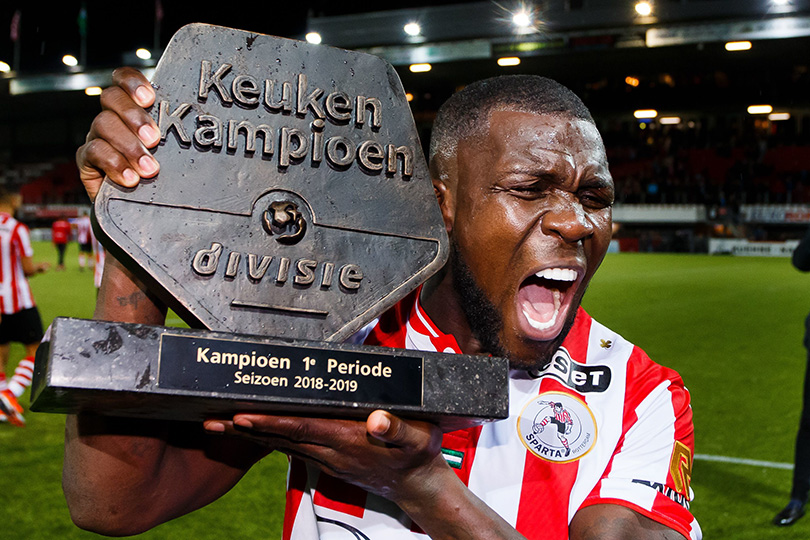
“I’m trying to make players aware that they can use their name for branding while they are playing football,” says Drenthe. “Many start to invest in a different career only when they’ve retired. I tell them they should brand themselves while they’re hot in their scene.”
By his own admission Drenthe was too easy-going in the past. “I was quite unstable,” he confesses, “and left responsibilities to others. I had money but didn’t take an interest in investing it myself. Without any second thought I signed documents given to me by my agents. I was way too young for those things.”
His early retirement was precipitated not only by anger and irritation at being owed back payments by clubs, but by the inevitable effects of that. Drenthe spent most of the money he earned during his playing years, with other people often the main beneficiaries of his generosity.
That aspect came to the forefront in his autobiography, released after he had hung up his boots, and drove him to become more financially aware. He’s noticed a change, adding: “In the past, I thought I’d never be able to communicate on the same level as businesspeople.”
How wrong he was. Drenthe has been sharing his experiences with a host of groups, from government officials to street coaches, and he aims to connect with Rotterdam’s homeless and elderly communities as he attempts to give something back to his home city.
But for now, at least, his primary focus is football again. The goal: to help Sparta Rotterdam win promotion. In 2018/19 they finished second, and will now compete in the play-offs to determine promotion to the Eredivisie.
When the one-cap wonder does look back on his career to date, he has no regrets. He doesn’t, for instance, ponder what might have happened if he’d stayed in the Netherlands for a while longer instead of leaving for Real Madrid at such a young age.
“It’s not interesting to think about, as it didn’t happen,” says Drenthe with a shrug. “At the time the choice felt like a simple one. Everything changes; I’m 31 now, and when I signed for Real I was 20. You can’t compare me with the person I was at that time. I was a little kid then. Now I’m a father to six kids myself.”
He does share the young Drenthe’s love for the game, thanks to his new beginning in Rotterdam. “The joy is there, like it was back then,” he insists. “When I entered the dressing room at Sparta this summer, I realised it was the kind of place that I’ve always enjoyed.”
Royston Drenthe is smiling again. As the tattoos on his teenage legs predicted, there was adversity after the initial delight – but he learned from the experience. Now he’s ready to take on whatever opportunity he can see in the world and, above all, enjoy playing football.
Then read...
BETWEEN THE LINES Jimmy Glass after football: "No matter how bad things got, I never wished the Carlisle goal hadn’t happened"
ACTION REPLAY The incredible adventures of Romario and Stoichkov in Barcelona
While you're here, why not take advantage of our brilliant new subscribers' offer? Get 5 copies of the world's greatest football magazine for just £5 – the game's greatest stories and finest journalism direct to your door for less than the cost of a London pint. Cheers!
Arthur Renard has been writing for FourFourTwo since 2013, when Ronald Koeman hosted him for a Readers interview in a small room in stadium De Kuip. Two years later Arthur moved to London, where he still lives and from where he covers English football, while he has also been travelling the world to cover events like the World Cup and Copa America.
